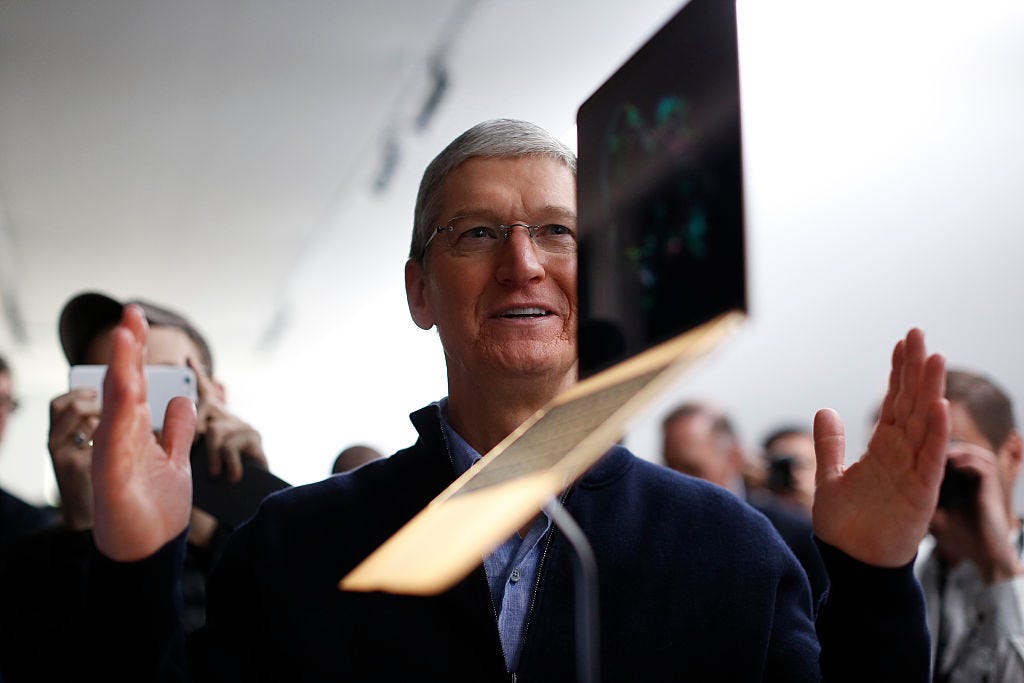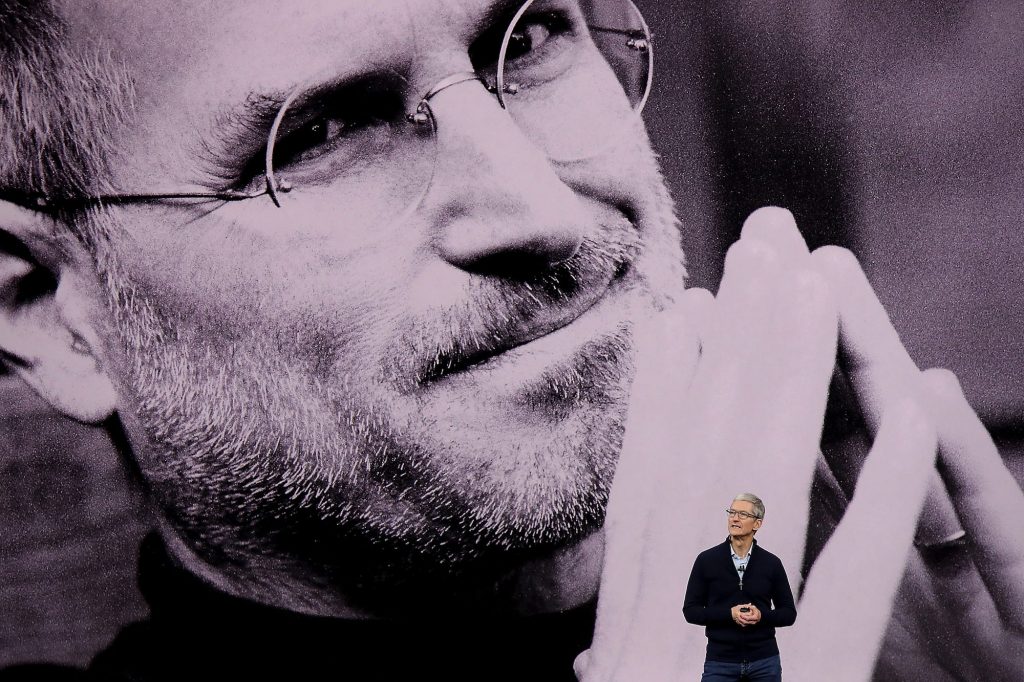- When Steve Jobs resigned as Apple CEO in August 2011, it marked the end of an epic 15-year burst of creative and commercial energy.
- Jobs’ successor, Tim Cook, was a skilled operator with no evidence of product vision.
- Even the most bullish Apple fans would not have imagined what’s happened since Cook took over.
It is human nature to have vivid memories of where you were when history happens. An earlier generation recited their whereabouts the moment John F. Kennedy was shot. I recall exactly what I was doing when the Challenger exploded (chatting with my college roommate) and when news of Michael Jackson’s death flashed on TV (having drinks with colleagues in Manhattan).
And I can pinpoint my location on Aug. 24, 2011, when my phone rang-it was a booker for Lou Dobbs at Fox Business calling-to inform me that Steve Jobs was stepping down as CEO of Apple. The world-famous entrepreneur was to be replaced by the still-not-particularly-well-known Apple operations chief, Tim Cook, whom I had profiled in Fortune three years earlier. Ten years ago this week I was at a playground with my daughter on vacation at the Jersey Shore, and so the best I could manage was a cell-phone interview.
Fox wanted me to address the uncomfortable question on everyone’s mind, then and for years to come: Could Apple survive without its singular leader? Jobs had been ill for a while, and he died less than two months later. The widespread assumption that Cook didn’t stand a chance would dog the new CEO for years.
The doubts about Cook were justified. He had none of the Jobsian qualities that made Apple one of the greatest business successes of our lifetimes. Where Jobs was a creative genius, Cook was a technocrat. Jobs studied fonts, personally reviewed ad copy, and broke the rules of business. Cook was an industrial engineering major with an MBA who’d spent years refining Apple’s supply chain.
I had a pressing professional reason for wrestling with this question. When Jobs died I was in the final throes of writing a book about Apple. It was to be an explanation of the culture and business processes Jobs had put in place during his second reign at the pioneering computer company, beginning in 1997. My book editor was leaning hard on me to make a call. Yes or no: Would Apple decline under Cook? I sought out clear-eyed opinions from people I respected. I interviewed Jack Welch, the retired General Electric CEO, who had known Jobs. He was emphatic that Apple's best days were behind it.
And yet one of my conclusions from my reporting was that Jobs wanted it both ways. He liked being thought of as the all-knowing decisionmaker. But he also took great pride in the systems he had put in place that made Apple hum. So I came up with an artful dodge. Under Cook, if he lasted as CEO, Apple would no longer be "insanely great" - one of Jobs's stock phrases to describe Apple's products - but instead would become merely great. Even had Jobs lived, I argued, Apple wouldn't have had another 15 years like the previous decade and a half, an explosively and uniquely innovative period. This burst of creative and commercial energy, after all, saw the introduction of the iMac, iTunes, the iPhone, and the iPad. But if the culture held up reasonably well, Apple would be fine on the strength of these products.
Members of the cult of Jobs were generally disdainful of my conclusion. George Colony, the CEO of tech-industry researcher Forrester, published an essay predicting Apple would now go the way of Sony, which declined when its charismatic leader passed from the scene. Already Apple was flagging. Siri was embarrassing in its mediocrity. Apple Maps were worse. The conventional wisdom at the time was that once Apple released the products in the pipeline while Jobs was alive, it would cease to be either exciting or outlandishly successful. It would, in short, be just another company.
So how has Cook done? Simply put, better than everyone expected. The company's market capitalization has increased by a factor of seven, from $350 billion to $2.5 trillion. While the iPad has faded, the iPhone charges along. Meantime, Cook built up a services businesses - songs, subscriptions, storage, movies and TV shows, games, and so on - that was an afterthought at $3 billion in revenue and $54 billion today.

It's true that Apple hasn't been the innovative machine it once was. Its neatest hits-the Apple Watch, AirPods-have been modest relative to their industry-defining predecessors.
But as a businessman, Cook has lived up to his billing. He made Apple slightly more open to the rest of the world, while generally retaining its cult-like secrecy. Once a wooden speaker and internally focused executive, he has transformed himself into an able spokesman and adroit political operator. His handling of Donald Trump, for instance, will be studied for years as a case study of how a CEO who presumably has a certain set of political beliefs holds his nose and engages with a repugnant government official for the good of his company.
For clarity, I'm neither praising nor condemning Cook for his dance with Trump. I'm saying Apple repeatedly escaped the worst of Trump's wrath under Cook's watch.
Those who doubted Cook mostly have conceded defeat. "He has played a perfect Brigham Young to Jobs's Joseph Smith," says Forrester's Colony now, referring to the founder of the Mormon church and his successor. "He took a small religion and made it a very large religion, a dominant religion. I was a doubter, but he was the perfect leader at a bad moment. Half the CEOs would have messed that up."
The doubts will never evaporate completely. Colony points out that Apple's revenue has grown only 7% at a compounded annual rate since 2012. Income is up a mere 36% in total. And 14 years after its introduction, Apple still has no successor breakout product to the iPhone. With sales of phones still accounting for half of Apple's revenue, the iPhone remains the Jobs-blessed sun around which all Apple products orbit.
Apple today is no longer insanely great. And Tim Cook is no Steve Jobs. But Apple is the world's most valuable company, and that happened under Cook's extended watch. A decade of success is no fluke.
Adam Lashinsky is an Insider contributor and former executive editor at Fortune magazine, where he spent 19 years. He is the author of two books: "Inside Apple" (about Apple) and "Wild Ride" (about Uber).
